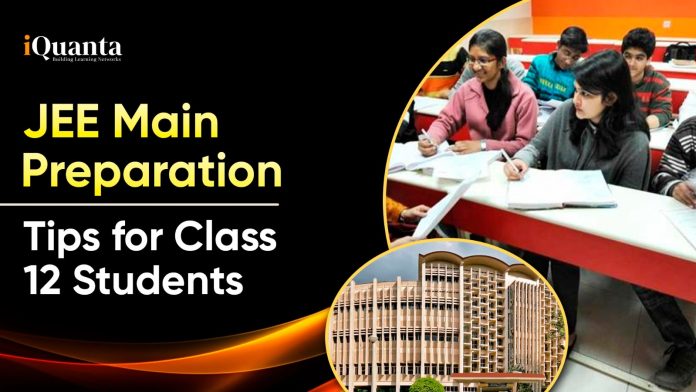Preparing for JEE Main alongside class 12 board exams is one of the most common challenges faced by engineering aspirants. Since both exams are crucial- especially for students aiming for top technical institutes- its important to create a well- balanced strategy which allows for effective preparation without burnout.
While it may seem overwhelming initially, managing both can be efficient and stress-free with the right planning. With only about a month separating the two exams, this guide offers smart tips and strategies to help you simultaneously excel in both JEE Main and your board exams.

Join this free JEE Prep Group to Get Free Study Material, Preparation Strategy by Toppers, Latest Updates and More!
Difference Between Class 12 Board Exams and JEE Main Exam Pattern
Both JEE Main and class 12th board exams hold significant importance for students, especially those pursuing engineering careers. While JEE Main is conducted by NTA, the Class 12th board exams are administered by educational boards, which include CBSE, ICSE, or various state boards. Below is a comparison table highlighting the key differences in their exam patterns:
| Particulars | JEE Main | Class 12th Board Examination |
| Type of Questions | Objective (MCQs) and Numerical Answer Type | Descriptive/Subjective |
| Syllabus | Based on both Class 11 and 12 syllabus | Primarily based on Class 12 syllabus only |
| Difficulty Level | High; designed to filter top performers for competitive engineering programs | Moderate; allows average students to score well |
| Negative Marking | Yes; -1 mark for each incorrect answer in MCQs | No negative marking |
How to Prepare for JEE Main with Class 12th Board Exam?
| Preparation Aspect | Strategy for Boards | Strategy for JEE Main |
| Study Plan | Follow the school syllabus and weekly planner | Integrate Class 11 concepts in your weekly schedule for JEE Main topics |
| Time Management | Dedicate 2–3 hours daily to board subjects | Allocate 3–4 hours for JEE Main preparation (focus on problem-solving) |
| Subject Approach | Focus on theoretical understanding and presentation skills | Focus on application, speed, and accuracy for MCQs and numericals |
| Syllabus Overlap | Prioritize common topics (e.g., Electrostatics, Organic Chemistry, Calculus) | Deepen understanding of overlapping topics and practice JEE-level questions |
| Revision Method | Make notes, flowcharts, and diagrams for theory | Solve PYQs, revise formulas, and take quizzes for concept clarity |
| Mock Tests | Solve board exam sample papers once a week | Take full-length JEE Main mock tests every 7–10 days |
| Answer Writing Practice | Practice structured, stepwise answers with diagrams | Practice fast and accurate objective-type solving |
| Resources to Use | NCERT textbooks and board sample papers | NCERT + reference books (HC Verma, Cengage, MS Chauhan) + online tests |
| Doubt Clarification | Ask school teachers or refer to guides | Use coaching sessions, online forums, or dedicated doubt-solving platforms |
| Final Month Strategy | Revise all board subjects thoroughly; write at least 3 mock tests | Focus on JEE-specific practice and give daily topic-wise or full mocks |
Important JEE Main Exam Preparation Tips
| Category | Tips | Details/Explanation |
| Understanding Exam Pattern | Know the syllabus & exam pattern thoroughly | Familiarize yourself with JEE Main subjects, types of questions (MCQs/Numerical), marking scheme, and time duration. |
| Create a Study Plan | Make a realistic and balanced timetable | Allocate time daily for Physics, Chemistry, and Mathematics. Include breaks and revision slots. |
| Concept Clarity | Focus on understanding fundamental concepts | Avoid rote learning. Understand why formulas and methods work; use NCERT and reference books for clarity. |
| Practice Regularly | Solve problems daily from various difficulty levels | Practice both easy and tough problems. Use previous years’ papers and sample questions. |
| Mock Tests & Previous Papers | Take timed mock tests regularly | Simulate exam environment to improve speed and accuracy. Analyze mistakes after each test to improve weak areas. |
| Time Management | Learn to manage time effectively during preparation and exam | Practice solving questions within a fixed time. Develop strategies for attempting easier questions first in the exam. |
| Revision | Schedule regular revisions | Revise topics multiple times to retain concepts. Use summary notes or flashcards for quick reviews. |
| Focus on Important Topics | Prioritize topics with higher weight and frequent appearance in past exams | For example, focus on Mechanics in Physics, Organic Chemistry reactions, and Algebra in Mathematics. |
| Use Quality Study Material | Stick to recommended books and trusted resources | NCERT books are essential for Chemistry. Use reference books like H.C. Verma for Physics and R.D. Sharma for Mathematics. |
| Clear Doubts Promptly | Don’t let doubts accumulate | Ask teachers, use online forums, or study groups to clarify doubts immediately. |
| Healthy Lifestyle | Maintain good physical and mental health | Sleep well, eat healthily, exercise moderately, and take breaks to reduce stress. |
| Stay Motivated & Positive | Keep a positive mindset and stay motivated throughout the preparation | Set short-term goals, reward yourself on achieving them, and avoid comparing yourself with others. |
| Exam Day Strategy | Plan your approach for the actual exam day | Reach exam center early, read instructions carefully, attempt questions strategically, and keep calm. |
| Use Technology Wisely | Use educational apps, online lectures, and test series for additional practice | Platforms like Unacademy, BYJU’S, or Khan Academy can provide helpful video lessons and mock tests. |
| Avoid Last Minute Cramming | Focus on revision and relaxation a day before the exam | Avoid learning new topics last minute to reduce anxiety and improve recall during the exam. |

I’m Consistent for a Few Days, Then I Crash” – How to Fix It?
It happens to almost every JEE aspirant, you study well for 3–4 days, feel productive, and then suddenly lose track. You skip one day, then another, and it becomes hard to restart. This kind of cycle can feel frustrating, but it’s actually very common. It’s fixable just a few small, real-life changes can help you get back on track and stay consistent. Here’s how:
1. Don’t start too big
Don’t make unrealistic targets from Day 1, If you try to study 10 hours from Day 1, you’ll get tired fast. Start with 3–4 focused hours and slowly increase as your habit builds.
2. Take proper breaks
Taking breaks during study sessions and a rest day or light study sessions in a week will reset your energy.
3. Focus on what you’re learning, not just hours
Instead of asking, “Did I study 8 hours?” ask, “Did I understand this chapter?” That’s what matters more.
4. Build small study habits
Create small daily rituals like starting your day with a 10-minute revision or ending it with a mock review. These are easier to follow than strict timetables. Track your progress daily it will boost your motivation.
5. Missed a day? Just restart.
It’s okay to fall off track. Don’t panic or try to study double the next day. Just pick up where you left off.
6. Give yourself small rewards
After a productive day or week, treat yourself watch an episode, go for a walk, or enjoy a snack. It keeps you motivated.
Common Mistakes to Avoid
Even if you’re trying your best, it’s easy to make a few common mistakes while preparing for both JEE Main and Class 12 board exams. These small errors can cause stress, waste your time, and even shake your confidence. But the good news is, if you know about them early, you can avoid them. Here are some mistakes you should be careful about:
- Neglecting Class 11 Syllabus:
Many students focus only on Class 12, forgetting that a major part of the JEE syllabus is from Class 11. Cover class 11 syllabus also to be well prepared. - Focusing Too Much on Theory, Not Practice:
Understanding concepts is important, but without regular problem-solving, especially for physics and math, it’s hard to score well. Practice questions daily it will build your speed and accuracy. - Skipping Mock Test Analysis:
Just taking mock tests isn’t enough. If you don’t analyze your mistakes, you’ll likely repeat them in the actual exam. - Relying Only on Coaching or Notes:
Some students skip NCERT or don’t revise from basics, which can cost them especially in Chemistry. Cover your NCERT’s first to make your basics strong. - Trying to Study for Long Hours Without Breaks:
Burnout is real. Studying non-stop without proper rest reduces efficiency and makes learning harder. Use pomodoro technique to study. - Comparing Yourself with Others:
Everyone learns at their own pace. Constantly comparing your progress can lead to unnecessary pressure and self-doubt. Everyone has a different path carve your own. - Ignoring Health and Sleep:
Poor sleep and unhealthy habits directly affect focus, memory, and energy levels during preparation. Try to sleep atleat 7 hours in a day proper sleep will help you increasing focus.
Join WhatsApp JEE Community
Preparing for JEE can feel lonely and stressful, especially if you’re doing it all alone. That’s why being part of a study group can really help. When you join the JEE WhatsApp community, you connect with students who are preparing just like you. You can ask questions, share study tips, get important updates, and stay motivated. It’s a place where you feel supported, and that support can help you stay consistent and confident in your preparation.

Join this free JEE Prep Group to Get Free Study Material, Preparation Strategy by Toppers, Latest Updates and More!
Why Choose iQuanta × ATP Star IIT JEE 2026 Full Course?
Key Highlights
| Feature | Details |
| Course Validity | Access till April 2026 – full support throughout your JEE journey |
| Complete Syllabus Coverage | Covers Class 11 & 12, from foundation to advanced levels |
| Total Hours | 1000+ hours: Live classes + recordings + doubt sessions + mock tests |
| AI-Based Mocks | After each class, get AI-powered topic-wise tests for precision learning |
| Crash Course | 2-month revision booster after syllabus completion |
| Targeted Strategy | Designed to help aspirants achieve 99+ percentile |
What Makes It Unique
| USP | What It Means for You |
| Dual Pedagogy | Learn via Live Stream + Application Classes for deeper concept mastery |
| Top IITian & Kota Faculty | Get mentored by those who’ve produced top 100 rankers |
| AI Performance Analytics | Track your strengths, weak areas, and improvement zones in real-time |
| Proven Results | Backed by 99+ percentile scorers and successful IIT admissions |
Click Here to Enroll to JEE 2026 Course!

JEE Main Preparation Tips for Class 12 Students – FAQs
Focus on NCERT concepts, create a balanced study plan, practice previous year papers, take regular mock tests, revise consistently, and clarify doubts promptly to excel in JEE Mains alongside 12th studies.
Class 12 concepts are crucial for JEE Mains, but Class 11 fundamentals are equally important. A strong grasp of both years’ syllabus, combined with regular practice and revision, is essential to score well in JEE Mains.
In Class 12, aim to study 6-8 hours daily for JEE preparation. Balance school syllabus with JEE topics, include regular revision, practice problems, and mock tests. Consistency and quality of study matter more than just hours spent.




